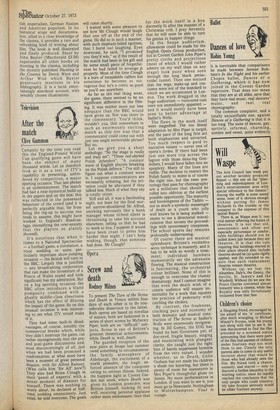Opera
Screw and death
Rodney Mikes
To present The Turn of the Screw and Death in Venice within four days of each other is to do considerable disservice to the latter. Both operas are based on novellas of stature, both are fashioned in a series of short scenes by Myfanwy Piper, both are on "difficult" subjects. Screw is one of Britten's greatest theatrical achievements, while Death is, well, death.
The guarded reception of the new. piece at Snape last summer owed something to circumstances: the family atmosphere of Aldeburgh, the excitement of a world premidre, the tragic enforced absence of the composer owing to, serious illness. Indeed, the happihst sight at Covent Garden last week, where Death was given its London premith-e, was Britten himself, looking fit and well, receiving personal applause rather more enthusiastic than that
for the work itself in a box discreetly lit after the manner of a Christmas crib. I pray fervently that he will soon be able to turn his genius to happier things. In the Snape auditorium, allowances could be made for the English Opera Group production, but at Covent Garden John Piper's pretty cloths and projections (most of which I would rather admire on my wall than on any stage) look puny when seen through the long black periactoidal tunnel. Then one noticed that the wigs, make-up and costumes were not of the standard to which we are accustomed in London. The work dragged in the huge auditorium — rumoured cuts were not immediately apparent — and it would surely have been seen to better advantage at Sadler's Wells.
The flaws in the work itself were magnified. The too literal adaptation by Mrs Piper is turgid, and the pace of the long first act both elephantine and unvaried. Too much respect is paid to narrative values — never one of opera's fortes. If there had been just one more trip across the lagoon with those miau-ing Gondoliers, I would have fallen into an apoplexy. Many of the lines are risible. The decision to restrict the Polish family to mime is of course the right one, but the twee posturings that pass for choreography are a millstone that should be rolled into oblivion at the earliest possible opportunity. The maturity and knowingness of the Tadzio — not so much a symbolic messenger of death as a youth who jolly well knows he is being stalked — seems to me a directorial miscalculation that invests the proceedings with unnecessary creepiness. The school sports day remains profoundly embarrassing. Of course there are musical splendours: Britten's recitativo secco technique is.masterly, and it has to be with so wordy a treatment; individual numbers momentarily set the adrenalin flowing. The musical construction is fascinating, the orchestral colour brilliant. None of this is enough to overcome the clumsy dramaturgy. And I cannot imagine that even the death wish of a coterie audience will ensure immortality for a work that equates the practice of pederasty with catching the cholera. By contrast, the freshness, cracking pace and economy of both dramatic and musical construction of The Screw at Sadler's Wells were enormously invigorat
ing. In Jill Gomez, the EOG has found its best Governess yet: of doe-eyed, fragile beauty, singing and enunciating with plangent clarity, she caught just the right hint of barely suppressed hysteria
from the very outset. I wonder whether, as in Death, Colin
Graham has not made his children a shade too knowing, but there is plenty of room for manoeuvre in Mrs Piper's thoughtful gloss on James. No more performances in London. If you want to see it, you
must go to Newcastle, Nottingham or Wolverhampton. Vaut le voyage.


































 Previous page
Previous page